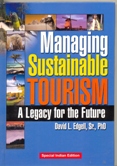
|
MANAGING SUSTAINABLE TOURISM (INDIAN REPRINT 2012) - DAVID L. EDGELL (EX) |
|
|
Cover Price : Rs 1,495.00
|
Imprint : T & F / Routledge
ISBN : 9780789027719
YOP : 2012
|
Binding : Hardbound
Total Pages : 163
CD : No
|
|
Intelligently designed tourism strategies for the twenty-first century!
Successful tourism development and marketing are dependent on maintaining a delicate balance between economic growth and the protection of environments. Managing Sustainable Tourism: A Legacy for the Future tackles the tough issues of tourism such as negative environmental impact and cultural degradation, and provides answers that don’t sacrifice positive economic growth. This essential book offers practical plans for fostering harmonious relationships among local communities, the private sector, not-for-profit organizations, academic institutions, and governments at all levels as well as develops management practices and philosophies that protect natural, built, and cultural environments while reinforcing positive and orderly economic growth.
Managing Sustainable Tourism discusses in-depth the sensible guidelines for protecting environment, heritage sites, and local culture while developing realistic tourism goals for compatible economic growth. Useful strategies for sustainable tourism are detailed for each tourism type, along with useful tried-and-true marketing techniques aimed at cooperation and respect for all types of environments. Case studies, research, and supplemental reading lists clearly illustrate ideas and the author’s qualified suggestions.
Managing Sustainable Tourism explores:
the future of the tourism industry
understanding sustainable tourism
the economics of community growth through tourism
marketing the sustainable tourism product
nature tourism
heritage tourism
cultural tourism
rural tourism
practical guidelines for sustainable tourism
a workable global sustainable tourism initiative
Managing Sustainable Tourism is an ideal resource for educators, students, developers, entrepreneurs, investors, tourism strategists, planners, policymakers, and anyone interested in sustainable tourism for the new millennium.
Contents
Foreword
(Stanley Selengut)
Preface
Acknowledgments
Chapter 1. Tourism Today and Tomorrow
Chapter 2. A Philosophic Approach to Sustainable Tourism
Chapter 3. Is Sustainable Tourism Economically Viable?
Chapter 4. Nature-Based Tourism: Don’t Fool with Mother Nature
Chapter 5. What Is Our Heritage?
Chapter 6. Culturally, Tourism Is Important
Chapter 7. Tourism Goes Country
Chapter 8. Strategies for Sustainable Tourism
Chapter 9. Managing Sustainable Tourism
Chapter 10. More to Say About the Future
Notes
Bibliography
Index |
|
 |
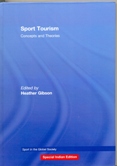
|
SPORT TOURISM: CONCEPTS AND THEORIES , INDIAN REPRINT 2012 - HEATHER GIBSON (EX) |
|
|
Cover Price : Rs 2,995.00
|
Imprint : T & F / Routledge
ISBN : 9780415348096
YOP : 2012
|
Binding : Hardbound
Total Pages : 290
CD : No
|
|
The study of sport tourism is on the cusp of moving from a descriptive phase of research into an analytical phase. Consequently, many academics and graduate students are searching for theories upon which to ground their work. This book draws upon theories and concepts from sociology and anthropology (the socio-cultural perspective), sport and tourism studies, and business studies. One of the dangers of a new area of study is that the body of knowledge is built on a range of seemingly unrelated studies. By grounding work in a theoretical perspective, future work can be linked to, and contribute to building a cohesive understanding of various aspects of sport tourism.
This book is an edited collection written by some of the top scholars in the field, providing a compendium of theories and concepts that can be used to frame research on various aspects of sport tourism.
This volume was previously published as a special issue of the journal Sport in the Global Society.
Contents
Part One
Understanding Sport Tourism: Socio-cultural Perspectives
1. Leisure Constraint Theory and Sport Tourism
2. Serious Leisure, Social Identity and Sport Tourism
3. Something Lived, Something Learned: Nostalgia's Expanding Role in Sport Tourism
Part Two
Sport and Tourist Studies: Theories and Paradigms
4. Towards and Understanding of 'Why Sport Tourists Do What They Do'
5. Building Sport Event Tourism into the Destination Brand: Foundations for a General Theory
6. Sport Tourism as an Attraction for Managing Seasonality
7. Host and Guest Relations and Sport Tourism
8. Sport Tourism, Cityscapes and Cultural Politics
9. Marketing Sport Tourism: Creating Synergy Between Sport and Destination
10.Service Quality Perspectives in Sport Tourism
11.Public Sector Support for Sport Tourism Events: The Role of cost-benefit Analysis
12.A Grounded Theory of the Policy Process for Sport and Tourism
13.The Management of Sport Tourism
Conclusion
Index
About the Author
Dr Heather Gibson is an Assistant Professor in the Department of Recreation, Parks and Tourism at the University of Florida |
|
 |
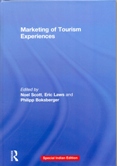
|
MARKETING OF TOURISM EXPERIENCES, INDIAN REPRINT 2012 - NOEL SCOTT (EX) |
Author |
NOEL SCOTT
ERIC LAWS
PHILIPP BOKSBERGER
|
|
Cover Price : Rs 2,995.00
|
Imprint : T & F / Routledge
ISBN : 9780415567589
YOP : 2012
|
Binding : Hardbound
Total Pages : 284
CD : No
|
|
This book provides a review of the current theory and practice of experiential tourism and how it is marketed. Many societies today are characterised by widespread individual wealth of an order previously confined to the elite with the consequence that ownership of ‘ordinary’ physical goods is no longer a distinguishing factor. Instead people are now seeking the ‘extraordinary’ with examples being bodies enhanced through surgery, personal fitness trainers, and, in the case of leisure and tourism, seeking unique and unusual places to visit and activities to undertake. This trend manifests in the increasing consumption of services and the addition of experiential elements to physical goods by businesses aware of societal changes. The trend is enhanced by rapidly changing technology and economic production methods providing new sectors of the world’s population with access to the consumption experiences that are repeatedly featured in the media. This is the experience economy, characterised by a search by consumers for fantasies, feelings, and fun.
This book was based on a special issue of Journal of Hospitality Marketing & Mangement.
Contents
Introduction
The Marketing of Hospitality and Leisure Experiences Noel Scott, Eric Laws, and Philipp Boksberger
1. Conceptualizing Experience: A Tourist Based Approach Serena Volo
2. Urban Tourism Precincts and the Experience of Place Tony Griffin and Bruce Hayllar
3. Reading the Landscape: The Development of a Typology of Literary. Trails that Incorporate an Experiential Design Perspective Nicola MacLeod, Deborah Hayes, and Alix Slater
4. The Consumption of Museum Service Experiences: Benefits and Value of Museum Experiences Jennifer Kim Lian Chan
5. Retail and Service Encounters: The Inter-Cultural Tourist Experience Katherine B. Hartman, Tracy Meyer, and Lisa L. Scribner
6. Student Travel Experiences: Memories and Dreams Michael Morgan and Feifei Xu
7. The Staging of Experiences in Wine Tourism Birgit Pikkemaat, Mike Peters, Philip Boksberger, and Manuela Secco
8. Marketing the Leisure Experience to Baby Boomers and Older Tourists Ian Patterson and Shane Pegg
9. Effect of Experience on Cognition, Affect and Satisfaction: The Case of Japanese Visitors to Macau Yi Chen, Xinran Y. Lehto, and Soojin Choi
10. Quality Tourism Experiences: Reviews, Reflections, Research Agendas Gayle Jennings, Young-Sook Lee, Amanda Ayling, Brooke Lunny, Carl Cater, and Claudia Ollenburg
11. Agenda for Co-Creation Tourism Experience Research Esther Binkhorst and Teun Den Dekker
12. Cultural experience Tourist Motives Dimensionality: A Cross-Cultural Study Pandora L.Kay
INDEX
About the Authors
Noel Scott is a senior lecturer in the School of Tourism, The University of Queensland, St Lucia, 4072, Australia
Eric Laws is an adjunct professor at James Cook University, Cairns, Queensland, Australia.
Philipp Boksberger is Director of the Institute for Tourism and Leisure Research at the University of Applied Science HTW Chur, Switzerland.
|
|
 |
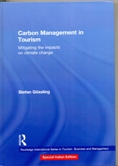
|
CARBON MANAGEMENT IN TOURISM , INDIAN REPRINT - STEFAN GOSSLING (EX) |
|
|
Cover Price : Rs 2,995.00
|
Imprint : T & F / Routledge
ISBN : 9780415566322
YOP : 2012
|
Binding : Hardbound
Total Pages : 366
CD : No
|
|
Climate change is one of the single most important global environmental issues facing the world today and is emerging as a major topic in tourism studies. Tourism is one of the world’s largest industries; it both contributes to, and will be notably affected by, climate change. Given the emerging global legal frameworks to reduce emissions of greenhouse gasses, growing costs of carbon and pro-environmentally orientated customers, carbon management in tourism is a necessity. Tourism must take responsive actions to enable travel and tourism to deliver the peak experiences that tourists seek with a lower carbon footprint.
Carbon Management in Tourism is the first book devoted to carbon emission reductions and to showcase a wide range of practical mitigation measures. This book provides a comprehensive overview by combining theory and practice of climate change mitigation in global tourism, addressing various levels of scale, such as global, national, and regional tourism systems, as well as individual tourism businesses. It integrates a thorough scientific discussion of the causes of emissions growth, along with an analysis of the major options to reduce emissions, and state-of-the-art carbon management practices. Detailed case studies provide examples of tourism businesses or destinations that have successfully reduced emissions of greenhouse gasses, with consideration of economic and socio-cultural issues integrated throughout.
This timely and important volume is essential reading for undergraduate and postgraduate students as well as academic researchers interested in Tourism, Environmental Management, Geography and Carbon Management.
Contents
1. Travel, Tourism and Carbon Management 2. Climate Change Mitigation: Reasons for Advocacy
3. Climate Change: The Physical Basis
4. Climate Change Mitigation
5. Tourism and Climate Change
6. Trends in Emission From Tourism
7. Understanding Emission Growth in Tourism
8. Mitigation: Systemic Considerations for Restructuring
9. Mitigation: Technology
10. Mitigation: Management
11. Mitigation: Education
12. Mitigation: Behavioural Change
13. Mitigation: Politics & Research
14. Planning for Change, Exploring Innovation
About the Author
Stefan Gössling is a Professor at the Department of Service Management, Lund University, and the School of Business and Economics, Linnaeus University, Sweden. He is also the research coordinator at the Western Norway Research Institute’s Research Centre for Sustainable Tourism. |
|
 |
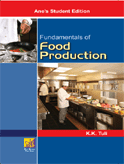
|
Fundamentals of Food Production - K.K. Tulli |
|
|
Cover Price : Rs 250.00
|
Imprint : Ane Books Pvt. Ltd.
ISBN : 9380156235
YOP : 2009
|
Binding : Paperback
Total Pages : 176
CD : No
|
|
New Arrival |
About the Book :-
This book gives vital information about the working of commercial kitchens in Hotels, Restaurants, Coffee shops and Flight Kitchens with regard to requirement of skilled manpower, the equipment and material utilised and all the activities involved in the production of authentic, wholesome
and sumptuous food dishes.
The book will definitely help in developing the culinary skills of students pursuing hotel/hospitality management, in-flight cabin services and those planning to setup their own catering establishments.
Contents :-
1. Food Production Area 2. Sections of the Food Production Area 3. Equipments Used in Commercial Kitchens 4. Manpower for Commercial Kitchens 5. Job Description of Each Incumbent 6. Importance of Hygiene and Sanitation in Commercial Kitchens 7. Material for Commercial Kitchens 8. Essential Utensils Used 9. Menu Merchandising 10. Mis-en-Place in Commercial Kitchens 11. Food Operational Cycle 12. Prevention of Food Adulteration Act, 1954, 13. Fire Fighting 14. Pest Control 15. Garbage Disposal 16. Display of Boards, Annexures, Glossary.
About the Author :-
K.K. Tuli is a graduate from the Institute of Hotel Management, Catering technology and Applied Nutrition, Pusa, New Delhi and has about 40 years of academic and operational experience to his credit. Thereafter, he taught restaurant service for 2 years and left for the West Germany in 1969 to work with M/s STEIGENBERGER K.G.A. a leading Chain of hotels and restaurants for 2 years and gained vast experience in all the sections of the catering industry.
He returned to India in 1971 and joined India Tourism Development Corporation Ltd.(ITDC) as Asst. Manager (Food & Beverage Controls) and after working in various units of the corporation, superannuated as General Manager in November, 2000.
In December, 2000, he joined Shri Banarsidas Chandiwala Sewa Smarak Trust Society, Kalkaji, New Delhi as advisor for their Hotel Management Institute and Director of the Institute of Information Technology, both Institutes affiliated to Guru Gobind Singh Indraprastha University, Delhi. He served them for about 3 years. |
|
 |
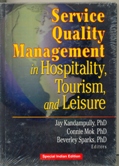
|
SERVICE QUALITY MANAGEMENT IN HOSPITALITY, TOURISM AND LEISURE (INDIAN REPRINT 2012) - Jay Kandampully (EX) |
Author |
Jay Kandampully
Connie Mok
Beverley Sparks
|
|
Cover Price : Rs 2,995.00
|
Imprint : T & F / Routledge
ISBN : 9780789007261
YOP : 2012
|
Binding : Hardbound
Total Pages : 358
CD : No
|
|
Does your staff deliver the highest quality service possible?
Customers today expect a very high overall level of service in hospitality, tourism, and leisure. Competition in these fields will thus be driven by strategies focusing on quality of service to add value, as opposed to product or price differentiation.
Service Quality Management in Hospitality, Tourism, and Leisure highlights concepts and strategies that will improve the delivery of hospitality services, and provides clear and simple explanations of theoretical concepts as well as their practical applications!
Contents
About the Editors
Contributors
Preface
Chapter 1. Concepts of Tourism, Hospitality, and Leisure Services
Chapter 2. Unique Characteristics of Tourism, Hospitality, and Leisure Services
Chapter 3. Service Quality Concepts and Dimensions Pertinent to Tourism, Hospitality, and Leisure Services
Chapter 4. The Impact of People, Process, and Physical Evidence on Tourism, Hospitality, and Leisure Service Quality
Chapter 5. Understanding the Role of the Service Encounter in Tourism, Hospitality, and Leisure Services
Chapter 6. Service Quality, Customer Satisfaction, and Value: An Examination of Their Relationships
Chapter 7. Competitive Advantages of Service Quality in Hospitality, Tourism, and Leisure Services
Chapter 8. Approaches to Enhance Service Quality Orientation in the United Kingdom: The Role of the Public Sector
Chapter 9. Service Quality Monitoring and Feedback Systems
Chapter 10. Measuring Service Quality and Customer Satisfaction
Chapter 11. Managing Service Failure Through Recovery
Chapter 12. Empowering Service Personnel to Deliver Quality Service
Chapter 13. Service Guarantee: An Organizations Blueprint for Assisting the Delivery of Superior Service
Chapter 14. Managing and Marketing Internal and External Relationships
Chapter 15. Cross-Cultural Issues in Service Quality
Chapter 16. Technology and Its Impact on Service Quality
Chapter 17. Delivering on Service:
What Are the Questions and Challenges for Tomorrows "Virtual University"? |
|
 |
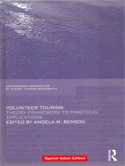
|
VOLUNTEER TOURISM (INDIAN REPRINT 2012) - Angela M. Benson |
|
|
Cover Price : Rs 2,995.00
|
Imprint : T & F / Routledge
ISBN : 0415576642
YOP : 2012
|
Binding : Hardbound
Total Pages : 284
CD : No
|
|
Volunteer Tourism is one of the major growth areas in contemporary tourism, where tourists for various reasons seek alternative goodwill experiences and activities. To meet this demand there has been a surge in volunteer programmes offered in range of destinations organized by a variety of charities and tour operators which is predicted to continue to grow in the future.
Volunteer Tourism provides an in-depth analysis of the complex issues associated with traditional and contemporary volunteer tourism. Reflecting the growth in this phenomenon, this book provides a cohesive collection of chapters written from a range of international expert scholars and researchers. The theoretically rich, practically applied and empirically grounded contributions are based on current and diverse research in the area. This groundbreaking volume explores topics which have not been addressed in the literature before, such as the impact on host communities, introducing new areas and ideas to the field. The diverse range of themes are identified and addressed, including volunteer tourism and sustainability to, uniquely, the examination of volunteer tourism stakeholders – volunteers themselves, the host-to-guest exchange, and the organizations – and management of volunteers. These themes are examined in a range of international case studies, demonstrating the wide range of issues associated with volunteer tourism.
This volume is a timely addition offering an innovative approach to the area. Volunteer Tourism will be of interest to both students and researchers interested in tourism, leisure and development, as well as non-academics, practitioners, NGOs government officials at all levels.
Contents
1. Volunteer Tourism: Theory and Practice
Part 1: The Volunteer: Motivation, Experiences and the Self
2. Understanding Voluntourism: A Glaserian Grounded Theory Study
3. VOLUNtourists versus volunTOURISTS: a true dichotomy or merely a differing perception?
4. Journeys of the Self: Volunteer Tourists in Nepal
5. Young Non-institutionalised Volunteer Tourists in Guatemala: exploring youth and self-development
6. Developing and promoting sustainable volunteer tourism sites in Sabah, Malaysia: experiences dimensions and tourists’ motives
7. Volunteer Tourism as a Life-Changing Experience
8. Self and Society in Voluntourism: A Thirty Year Retrospective Analysis of Post Trip Self Development of Volunteer Tourists to the Israeli Kibbutz
Part 2: Expanding the Boundaries on Volunteer Tourism Research
9. Volunteer Tourism and Divers with Disabilities: Evidence from Malaysia
10. Profiling volunteer holiday leaders: a case study of National Trust working holiday leaders – socio-demographics, basic human values and functional volunteer motivations
11. Volunteer Archaeological Tourism: An Overview
12. Managing volunteers: An application of ISO 31000:2009 Risk Management - Principles and guidelines to the management of volunteers in tourism and beyond
13. Volunteer Tourism and Intercultural Exchange: Exploring the ‘Other’ in the Experience
14. Volunteer Tourism: How do we know it is ‘making a difference’?
15. How does it make a difference? Towards ‘accreditation’ of the development impact of volunteer tourism
16. Volunteer Tourism: Structuring the Research Agenda
About the Author
Dr Angela M. Benson is Divisional Leader for Tourism at the University of Brighton, Adjunct Associate Professor, University of Canberra, and Founding Chair of the ATLAS Volunteer Tourism Research Group. |
|
 |
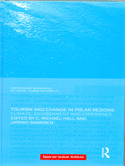
|
TOURISM AND CHANGE IN POLAR REGIONS (INDIAN REPRINT 2012) - C.Michael Hall |
Author |
C.Michael Hall
Jarkko Saarinen
|
|
Cover Price : Rs 2,995.00
|
Imprint : T & F / Routledge
ISBN : 0415489997
YOP : 2012
|
Binding : Hardbound
Total Pages : 336
CD : No
|
|
The world’s polar regions are attracting more interest than ever before. Once regarded as barren, inhospitable places where only explorers go, the north and south polar regions have been transformed into high profile tourism destinations, increasingly visited by cruise ships as well as becoming accessible with direct flights. Tourism is seen as one of the few economic opportunities in these regions but at the same time the polar regions are being opened up to tourism development they are being affected by a number of new factors that are interconnected to travel and tourism. Climate change, landscape and species loss, increasing interest in energy resources and minerals, social changes in indigenous societies, and a new polar geopolitics all bring into question the sustainability of polar regions and the place of tourism within them.
This timely volume provides a contemporary account of tourism and its impacts in polar regions. It explores the development and prospects of polar tourism, as well as tourism’s impacts and associated change at high latitudes from environmental, economic, social and political perspectives. It draws on cutting edge research from both the Arctic and Antarctic to provide a comparative review and illustrate the real life issues arising from tourism’s role in these regions. Integrating theory and practice the book fully evaluates varying perspectives on polar tourism and proposes actions that could be taken by local and global management to achieve a sustainable future for polar regions and development of tourism.
This complete and current account of polar tourism issues is written by an international team of leading researchers in this area and will have global appeal to higher level students, researchers, academics in Tourism, Environmental Studies, Arctic/Polar Studies and conservation enthusiasts alike.
Contents
1. Tourism and Change in the Polar Regions: Introduction – Definitions, Locations, Places and Dimensions
2. Tourism and Change in the Northern Polar Regions: Impacts, Climate Change and Biological Invasion
3. Cruise Tourism in Arctic Canada: Navigating a Warming Climate
4. Climate Change and Polar Bear Viewing: A Case Study of Visitor Demand, Carbon Emissions and Mitigation in Churchill, Canada
5. Climate Disruption and the Changing Dynamics of Polar Bear – Human Interactions in Northern Ontario: A Case Study of Polar Bear Management in Polar Bear Provincial Park, Ontario, Canada
6. Cruise Tourist Experiences and Management Implications for Auyuittuq, Sirmilik and Quttinirpaaq National Parks, Nunavut, Canada
7. A Holiday on Ice on Hold? Nature-based Tourism and Climate Change in the Nordic North
8. Sustainability and Emerging Awareness of a Changing Climate: The Tourism Industry’s Knowledge and Perceptions of the Future of Nature-based Winter Tourism in Finland
9. Constraints and Opportunities in the Development of Diamond Tourism in Yellowknife, NWT
10. Cultural heritage tourism in Antarctica and Svalbard: Patterns, Impacts, and Policies
11. Narratives of history, environment and global change: expeditioner-tourists in Antarctica
12. "Awesome size…magnitude of the place…the incredible beauty…": Visitors’ onsite experiences in the Ross Sea region of Antarctica
13. Images of Antarctica and Ushuaia (Argentina) as a Gateway Port: Antarctic Visitors and Their Expectations
14. Business as (Un)Usual: Integrated Scenario Analysis for Tourism in Antarctica
15. Tourism, Conservation and Visitor Management in the Sub-Antarctic Islands
16. Contested Place and the Legitimization of Sovereignty through Tourism in Polar Regions
17. Last Chance to See? Future Issues for Polar Tourism and Change
Michael Hall is Professor, Department of Management, University of Canterbury, New Zealand; Docent, Department of Geography, University of Oulu, Finland and Visiting Professor, Baltic Business School, Linnaeus University, Kalmar, Sweden. Co-editor of Current Issues in Tourism he has published widely in tourism and mobility, gastronomy and environmental history.
Jarkko Saarinen is Professor of Human Geography at the University of Oulu, Finland. His research interests include tourism development and its impacts and sustainability in peripheries. He is co-author of the book Nordic Tourism (2009), with C. Michael Hall and Dieter Muller. |
|
 |
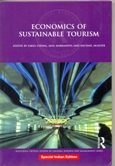
|
ECONOMICS OF SUSTAINABLE TOURISM (INDIAN REPRINT 2012) - Fabio Cerina (EX) |
Author |
Fabio Cerina
Anil Markandya
Michael Mcaleer
|
|
Cover Price : Rs 2,995.00
|
Imprint : T & F / Routledge
ISBN : 9780415583855
YOP : 2012
|
Binding : Hardbound
Total Pages : 206
CD : No
|
|
Tourism is one of the worlds largest industries and one of its fastest growing economic sectors helping to generate income and employment for local people. At the same time, it has many negative outsourced effects on the environment and local culture. Achieving a more sustainable pattern of tourism development is high on the global agenda aiming to meet human needs while preserving the environment now and for the future.
The Economics of Sustainable Tourism aims to critically explore how tourism economic development can move closer to a sustainable ideal from a firm economic analytic anchor. Grounded in economic theory and application it analyzes tourist’s satisfaction and impacts of tourism on the host community, investigates the productivity of the industry and identify factors which could increase economic and sustainable development such as trade relationships. It offers further insight into how destinations sustainability can be measured, economic benefits of a more sustainable destination and sets the agenda for future research. The book includes a range of theoretical and empirical perspectives and includes cutting edge research from international scholars.
This significant volume provides a new perspective on the sustainable tourism debate and will be a valuable read for students, researchers, academics of Tourism and Economics.
Contents
1: Time Series Modelling of Tourism Demand from the USA, Japan and Malaysia to Thailand
2: Determinants of Tourist Satisfaction at Sun and Sand Mass Destinations
3: Determinant Attitudes to Tourism in a Mass Tourist Destination: A Comparative-Static Analysis
4: A Panel Data Analysis of Residential Water Demand in a Mediterranean Tourist Region: the Case of Sardinia
5: Pollution Adverse Tourists and Growth
6: On the relationship between tourism and trade
7: Evaluating Labour Productivity of Diversifying Rural Tourism: Evidence from Japan
8: Clustering tourism destinations by means composite indexes of sustainability
9: Equilibrium dynamics and local indeterminacy in a model of sustainable tourism
10: How tourism can help preserve cultural heritage sites: Constructing optimal entrance fee schemes to collect visitors’ WTP for the world heritage site My Son in Vietnam
Fabio Cerina is Lecturer in Economic Policy at the Deparment of Social and Economic Research, University of Cagliari, and Research Fellow at the Center for North South Economic Research (CRENoS).
Anil Markandya is Professor of Economics at the University of Bath, UK, and Scientific Director of the Basque Centre for Climate Change in Bilbao, Spain.
Michael McAleer is Distinguished Professor, Department of Quantitative Economics, Complutense University of Madrid, Spain. |
|
 |
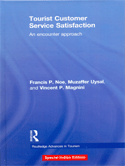
|
TOURIST CUSTOMER SERVICE SATISFACTION (INDIAN REPRINT 2012) - Francis P. Noe |
Author |
Francis P. Noe
Muzaffer Uysal
Vincent P. Magnini
|
|
Cover Price : Rs 2,995.00
|
Imprint : T & F / Routledge
ISBN : 0415578042
YOP : 2012
|
Binding : Hardbound
Total Pages : 206
CD : No
|
|
Customer satisfaction and loyalty in the tourism sector is highly dependent upon the behaviours of front-line service providers. Service is about people, how they relate to one another, fulfill each other’s needs and ultimately care for each other. Yet surprisingly there are few or any books which focus on the detailed specifics of the social exchange and interaction between the service provider and customer.
Tourist Customer Service Satisfaction fully explores this relationship by defining the specific kind of verbal and non-verbal messages needed for successful exchanges, outlining how the service provider ought to behave & cope in a situation as well as detailing positive approaches that enhance a service provider’s role performance. The book uses encounter theory to examine the customer – provider relationship as well as drawing on current research and theories from hospitality, tourism, management, psychology bodies of literature. In doing so the book offers important insight into how employee – centric competitive advantage in this sector can be achieved in various markets.
This book is unique in its approach by focusing on the specifics of the social exchange and interaction between the service provider and customer. It therefore offers a novel synthesis of knowledge on service satisfaction in the tourism sector which will serve as valuable pedagogical and research reference for students and academics interested in hospitality and tourism.
Contents
1: Defining Encounter Theory Chapter
2: Encountering Interactive Roles
3: Knowing the Customer Travel Role
4: Managing the Travel Situation Chapter 5: Positioning the Travel Provider
6: Appealing to the Travel and Provider Roles
7: Interacting Service Actions Chapter 8: Going Beyong Satisfaction to Loyalty 9: Where Do We Go From Here?
Bibliography
Index
Francis P. Noe Ph.D. is the retired Southeast Regional Social Scientist for the National Park Service, U.S. Dept. of Interior. His work focused on social satisfaction surveys and studies measuring the public’s perceptions, attitudes and values toward facilities, services and programs. The results not only provided applied information for NPS management but were relevant to the recreation and tourism industries.
Dr. Uysal, Professor of Tourism in the Department of Hospitality and Tourism Management – Pamplin College of Business at Virginia Polytechnic Institute and State University, has extensive experience in the travel and tourism field. He is a member of the International Academy for the Study of Tourism, the Academy of Leisure Sciences, and serves as co-editor of Tourism Analysis: an Interdisciplinary journal. In addition, he sits on the editorial boards of several journals, including Journal of Travel Research, and Annals of Tourism Research as resource editor. He received a number of awards for research, excellence in international education, and teaching excellence. His current research interests center on tourism demand/supply interaction, tourism development, and QOL research in tourism.
Vincent P. Magnini is an Assistant Professor of Hospitality Marketing (Ph.D., Old Dominion University), Department of Hospitality and Tourism Management, Virginia Polytechnic Institute and State University (Virginia Tech). He has significant expertise in the area of customer satisfaction in service settings, authoring or co-authoring numerous articles in hospitality, marketing, and management journals on the subject. He serves on the editorial boards of the Cornell Hospitality Quarterly and the Journal of Vacation Marketing. He has also received a number of awards for Research, Institutional Leadership Ability, and Teaching Excellence. His current research interests focus on blending marketing and strategic management theories with the intent of identifying opportunities for sustainable competitive advantage for hospitality and tourism firms.
|
|
 |
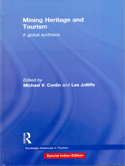
|
MINING HERITAGE AND TOURISM (INDIAN REPRINT 2012) - Michael V. Conlin |
Author |
Michael V. Conlin
Michael V. Jolliffe
|
|
Cover Price : Rs 2,995.00
|
Imprint : T & F / Routledge
ISBN : 0415560900
YOP : 2012
|
Binding : Hardbound
Total Pages : 276
CD : No
|
|
Many former mining areas have now lost their industrial function and are now turning to tourism for regional revitalization and community economic development. The transformation process of these industrial, and in some cases derelict, mining sites and landscapes into an area of interest for tourists is a major challenge both for planners and for tourism managers. It involves complex consideration to both the preservation of the physical site and community mining heritages as well as the health, safety and environmental factors inherent in opening these vast sites to the public.
Mining Heritage and Tourism includes contributions from internationally recognized authorities and is the first book to focus on the issues, challenges and potentials in redeveloping mines as cultural heritage attractions which are explored thematically throughout the book. It draws on multidisciplinary research to consider the dichotomy between heritage preservation and tourist development goals for mining heritage sites as well as to explore the practical challenges of developing these sites. These themes are illustrated by case studies from a vast range of geographical locations around the globe to offer operational insights into the planning and management of these sites for both heritage and tourism purposes, as well as innovative site management techniques.
There has never before been a more comprehensive book on mining heritage tourism representing the latest developments in strategy, policy and practices. This book serves as an invaluable guide for students, researchers, academics and practitioners in the areas of Tourism and Heritage Management.
Contents
Section 1: Introduction 1. What Happens When Mining Leaves? Section 2: Interpreting Mining Heritage 2. The Making of Two Mining Museums: Bowes and Beamish, North East England 3. Chinese Mining Heritage and Tourism in the Goldfields of the Pacific Rim 4. Pilgrimage in Heritage Tourism: Finding Meaning and Identity in the Industrial Past 5. Branding Beaconsfield: The Great Escape Puts Small Tasmanian Town on the Tourist Map Section 3: Transforming Mines into Heritage Attractions 6. Mining the Museum: A Rich Vein for Dissent 7. Transforming Working Mines into Tourist Attractions: Conceptual and Practical Considerations 8. Developing a Heritage Tourism Attraction in a Working Salt Mine: The Kansas Underground Salt Museum 9. Interpreting the Environmental Impacts of the Gold Rushes at the Castlemaine Diggings National Heritage Park 10. Sustaining the Benefits of Heritage Mining for Site, City and Region: Exploring the Success of Sovereign Hill Outdoor Museum Section 4: Traditional Mining Attraction Destinations 11. Flogging a Dead Horse or Creating Cultural Capacity? The Development and Impact of Mines as Alternative Tourist Destinations: A Case Study of South Wales, UK 12. The Benefits and Challenges of Implementing Tourism in Mining Communities Attractions 13. Geotourism Sites Development in Slovakia Geza 14. Mining Tourism in the Spanish Province of Huelva: The Case of the Mining Park of Riotinto Section 5: Globalization and the Future of Mining Attraction Destinations 15. Planning For the Future: Tourism Options for an Open Pit Mine, Vietnam 16. Mining Tourism in Ouro Preto (Brazil): Opportunities and Challenges 17. Mining Heritage, Local Development and Identity: The Case of Sardinia Giovanni Sistu 18. Developing Geological Tourism in the Bay of Fundy Region 19. From Mining Boom Towns to Tourist Haunts: Ghost towns and Mining Heritage Section 6: Lessons Learned 20. Lessons in Transforming Mines into Tourism Attractions
Michael V. Conlin is a Professor in the Okanagan School of Business in Kelowna, BC, Canada. He also teaches for the University of Guelph and Royal Roads University. His academic interests include island tourism and his current work includes an investigation of the use of industrial infrastructure for touristic purposes in British Columbia and elsewhere.
Lee Jolliffe is an Associate Professor of Hospitality and Tourism at the University of New Brunswick, Saint John. Her academic work explores the use of culture for tourism in a variety of contexts that include rural and island tourism situations.
|
|
 |
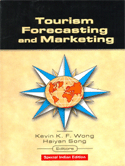
|
TOURISM FORECASTING AND MARKETING (INDIAN REPRINT 2012) - KEVIN K.F. WONG |
Author |
KEVIN K.F. WONG
HAIYAN SONG
|
|
Cover Price : Rs 1,495.00
|
Imprint : T & F / Routledge
ISBN : 0789020864
YOP : 2012
|
Binding : Hardbound
Total Pages : 158
CD : No
|
|
Tourism Forecasting and Marketing presents vital, up-to-date research on the latest practice and applications of tourism demand modeling and forecasting. The book addresses both econometric and time series approaches to forecasting, focusing on the concepts, model specification, data analysis, and methodologies used in day-to-day tourism planning. An international panel of practitioners and academics call on a diverse range of empirical research findings to discuss commonly used theoretical frameworks for forecasting and future directions tourism demand is likely to take.
Tourism Forecasting and Marketing presents research findings from the United States, the United Kingdom, Asia, and Australia that are invaluable for guiding government and private sector tourism investment and development decisions. The book addresses traditional versus modern forecasting techniques; evaluations of current and past forecasting methods; modeling and forecasting destination choice; and the impact of forecasting and marketing on tourism demand. Topics include:
using time series models to forecast inbound tourism demand for China and Greece
determining the economic factors that influence tourism demand in Hong Kong, Indonesia, and Malaysia
examining domestic travel expenditures in South Korea
developing a model to forecast ski tourism
using the Palmore cohort analysis for tourism forecasting
and much more!
Tourism Forecasting and Marketing is an important textbook for educators and students working in tourism policy planning and management, and tourism marketing. The book is equally effective as a reference for travel and tourism researchers, and for professionals dealing with tourism demand analysis and forecasting.
Contents
• Introduction: Tourism Forecasting: State of the Art
• Forecasting China’s Monthly Inbound Travel Demand
• Forecasting International Tourism Demand for Greece: A Contingency Approach
• Factors Affecting Demand for Tourism in Hong Kong
• Modeling Tourist Flows to Indonesia and Malaysia
• Determinants of Domestic Travel Expenditure in South Korea
• Trends and Forecasts for Inbound Tourism to China
• Learning and Ability to Pay: Developing a Model to Forecast Ski Tourism
• Forecasting Travel Patterns Using Palmore’s Cohort Analysis
Index
|
|
 |
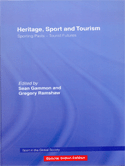
|
HERITAGE, SPORT AND TOURISM (INDIAN REPRINT 2012) - SEAN GAMMON |
Author |
SEAN GAMMON
GREGORY RAMSHAW
|
|
Cover Price : Rs 1,995.00
|
Imprint : T & F / Routledge
ISBN : 0415442480
YOP : 2012
|
Binding : Hardbound
Total Pages : 166
CD : No
|
|
Sport heritage is increasingly being recognised as a potent instigator of tourism; be it touring a historic stadium, visiting a sports hall of fame, or participating in a sport fantasy camp, tourists now have a vast array of locations and options to experience the sporting past. This book provides the first comprehensive resource on sport heritage as a tourist attraction. Using theoretical and applied studies from researchers in the United Kingdom, the Netherlands, Canada, the United States, Australia, and New Zealand, this book finds that the sporting past is a key component in tourism’s future.
The convergence of heritage, sport and tourism involves many different and diverse fields, including sport tourism, heritage tourism, sport management, and sports geography. This book will serve the needs of students, researchers, industry practitioners in these fields, as well as those interested in sport heritage as a tourist attraction.
This book was first published as a special issue of the Journal of Sport Tourism.
Contents
1. Introduction: Sport, Heritage and the English.
An Opportunity Missed?
2. More than just Nostalgia? Exploring the Heritage/Sport
Tourism Nexus
3. Stadia Tours and the Power of Backstage
4. Heritage, Sport Tourism and Canadian Junior Hockey: Nostalgia for Social Experience or Sport Place?
5. Expanding the Conceptualization of Nostalgia Sport Tourism: Lessons Learned from Fans Left behind after Sport Franchise Relocation
6. The Sustainability of Sports Heritage Attractions: Lessons from the Australian Football League Hall of Fame
7. Olympic Opportunity: Realizing the Value of Sports Heritage for Tourism in the UK
8. The Spectacle of the Past: Leveraging History in Fenway Park and Camden Yards
9. Sport, Nostalgia and Tourism Planning: The Case of the 2005 British and Irish Lions Tour of New Zealand
Conclusion: The Future of the Sporting Past Gregory Ramshaw
Notes on Contributors
Index |
|
 |
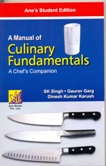
|
MANUAL OF CULINARY FUNDAMENTALS - S.K. SINGH |
Author |
S.K. SINGH
GAURAV GARG
DINESH KUMAR KARUSH
|
|
Cover Price : Rs 295.00
|
Imprint : Ane Books Pvt. Ltd.
ISBN : 9789382127031
YOP : 2016
|
Binding : Paperback
Total Pages : 264
CD : No
|
|
About the Book
This book is written keeping in view the interest of budding professionals in field of food Culinary. This hand book is a guide to Indian and Western Kitchen for Hotel Management, Culinary Arts students as well as for participating chefs in culinary industry. Easy tips and conversion tables along with practical experience are given to enhance the skill levels. The vocabulary for Indian Kitchen and Western Kitchen will help students and learners to crack the complex terminology. Well demanded photographs and sketches related with meat, poultry and fish cuts have been included to ease the understanding on concern topics. It would provide an insight to Culinary Basics and help the reader refresh them in a snapshot.
Contents
1 Conversion Table
2 Equipments
3 Knife and Its Parts
4 Fire Safety in Kitchen
5 Hierarchy of Five Star Hotel Kitchen
6 Layout of a Five Star Hotel Kitchen
7 Misc-en-Place and Vegetable Cuts
8 Cooking
9 Vegetable Pigments
10 Fish Cuts
11 Poultry Cut
12 Lamb Cuts
13 Beef Cuts
14 Eggs
15 Stock
16 Sauce
17 Soups
18 Parts of Salad
19 Types of Dressings
20 Garden Greens
21 Variety of Fruits and Vegetables
22 French Classical Menu
23 Sandwich
24 Cheese
25 Standard Accompaniments
26 Matching Herbs and Spices
27 Garde Manger
28 Types of Gravy
29 Indian Culinary Preparations
30 Tandoor
31 Indian Vocabulary
32 Indian Terminology
33 Western Vocabulary
34 Hazard Analysis and Critical Control Point (HACCP)
35 Menu Planning
36 Introduction to Bakery and Pastry
37 Kitchen Stores Management
About the Authors
Prof. Shailendra Kumar Singh, DHMCT from GIHM, MTM from IGNOU, awarded Honorary Doctorate in the field of Hospitality Management by Corlins University and is presently working as COO, AIHM, Haldwani (Nainital).His awareness towards a free working environment has made AIHM one of the most promising places to work in. He is a Chef turned Academician and has been sharing his experiences through various Research Papers and publications.
Mr. Gaurav Garg, DHMCT from IHMCT & AN, Hyderabad, MTM from IGNOU, is presently working as Assistant Professor, AIHM, Haldwani (Nainital).He has been serving the Industry for the past 12 years and has worked with various organizations like the Oberoi Grand, Kolkata, Carnival Cruiselines, Miami, Florida, U.S.A and Café Coffee Day. As a Chef, he has a vast experience with these organizations and now as an Academician he has been imparting knowledge to the budding hoteliers. He specializes in International Cuisine and Larder Cookery.
Mr. Dinesh Kumar Karush, DHMTfrom IHMCT & AN, Lucknow, MTM from IGNOU, Executive MBA from IICT, Lucknow, Pursuing Ph.D from CMJ University, Meghalaya and is presently working as Assistant Professor, AIHM, Haldwani (Nainital).He has been serving the Industry for the past 12 years and has worked with various organizations like TheOberoiAmarvilas, Norwegian Cruise Liner, U.S.A and The Sheraton Group. He specializes in Gardemanger and Cold Cookery.
|
|
 |
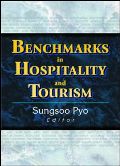
|
BENCHMARKS IN HOSPITALITY AND TOURISM (INDIAN REPRINT 2012) - SUNGSOO PYO (EX) |
|
|
Cover Price : Rs 1,495.00
|
Imprint : Haworth Press
ISBN : 9780789019141
YOP : 2012
|
Binding : Hardbound
Total Pages : 176
CD : No
|
|
How much money is your business wasting? How good is the service you deliver?
This pioneering book will familiarize you with benchmarking techniques that can be used to gauge and improve the performance of hospitality and tourism businesses anywhere! With compelling case studies drawn from hotel management, environmental systems, and destination practices, it examines important aspects of benchmarking, including satisfaction barometers, indicator development, and finding/networking with benchmarking partners.
After an overview of benchmarking concepts and processes, this essential book explores:
benchmarking’s strengths and weaknesses
ways to apply benchmarking to tourist facilities and destinations
the role of customer satisfaction and loyalty in benchmarking--and a way to efficiently measure it
a procedure for identifying benchmarking partners
the Tyrolean Tourism Barometer--its value, its usefulness, and ways to improve it
the changing functions of hotel front office operations and procedures and benchmarks that can help empower front office employees
benchmarks in quality management
benchmarks in accreditation for hospitality and tourism businesses
a case study of environmental management systems for Caribbean resorts and hotels--how they have saved money on water, electricity, diesel fuel, and liquefied petroleum gas while improving environmental performance
cONTENTS
• Introduction
• Benchmarking the Benchmarks
• Articles
• An Overview of Benchmarking Literature: Its Strengths and Weaknesses
• Guest Satisfaction Barometer and Benchmarking: Experiences from Austria
• A Heuristic Model for Benchmarking SME Hotel and Restaurant Business on the Internet
• Development Opportunities for a Tourism Benchmarking Tool—The Case of the Tyrol
• Benchmarking Best Practice in Hotel Front Office: The Western European Experience
• Managing Quality in Hotel Excelsior
• Serviced Accommodation, Environmental Performance and Benchmarks
• Environmental Management Systems for Caribbean Hotels and Resorts: A Case Study of Five Properties in Jamaica
Index
Reference Notes Included
|
|
 |
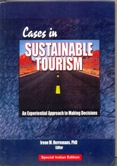
|
CASES IN SUSTAINABLE TOURISM (INDIAN REPRINT 2012) - IRENE M. HERREMANS (EX) |
Author |
IRENE M. HERREMANS
|
|
Cover Price : Rs 2,995.00
|
Imprint : T & F / Routledge
ISBN : 9780789027641
YOP : 2012
|
Binding : Hardbound
Total Pages : 318
CD : No
|
|
Cases in Sustainable Tourism will prepare your students to become “problem solvers” when faced with real-life decisions in the hospitality and tourism industry. The book is equally valuable as a training tool for professional development programs offered by corporations, professional associations, and park personnel.
CONTENTS
About the Editor
Contributors
Acknowledgments
Part I: Introduction to Cases and Environmental Thought Leaders
Chapter 1. Overview of Cases and Their Use in Experiential Learning
Chapter 2. UNESCO: World Heritage Convention and Man and the Biosphere Programs
Part II: Traveling Responsibly
Chapter 3. Implementing Ecosystem Management: Mount Assiniboine Lodge, Mount Assiniboine Provincial Park, British Columbia
Chapter 4. Flying High: The Airlines and the Environment—Freedom Airlines, Inc.
Chapter 5. The Greening of the Fairmont Palliser
Part III: Sustainable Nature-Based and Adventure Tourism Activities
Chapter 6. The State of the Pacific Northwest Whale Watching Industry, 1999
Chapter 7. Treadsoftly An Environmental Education Company Inc.—The Environment and the Business of Backcountry Tours, Part 1: Understanding Stakeholder Issues
Chapter 8. Treadsoftly An Environmental Education Company Inc.—The Environment and the Business of Backcountry Tours, Part 2: Creating Environmental Controls
Chapter 9. Canadian Mountain Holidays: Risk Assessment and Management
Chapter 10. Ski Resorts: Enjoyment versus Environmental Responsibility—Does There Have to Be a Choice?
Chapter 11. Vacations by the Sea: Troubled Waters
Chapter 12. Yosemite National Park: Parks Without Private Vehicles
Chapter 13. Grand Canyon National Park: Tourists by Land, Tourists by Air
Chapter 14. Addressing Tourism Conflicts in Banff National Park: The Banff Bow Valley Round Table Process
Chapter 15. A Journey to Define Sustainability: Waterton Lakes National Park
Chapter 16. Costa Rica: Banana Plantations or Ecotourism
Chapter 17. CAMPFIRE: A Sustainable Use of Wildlife Resources?
Chapter 18. Ecotourism in Extractive Reserves in Brazil
INDEX |
|
 |
|